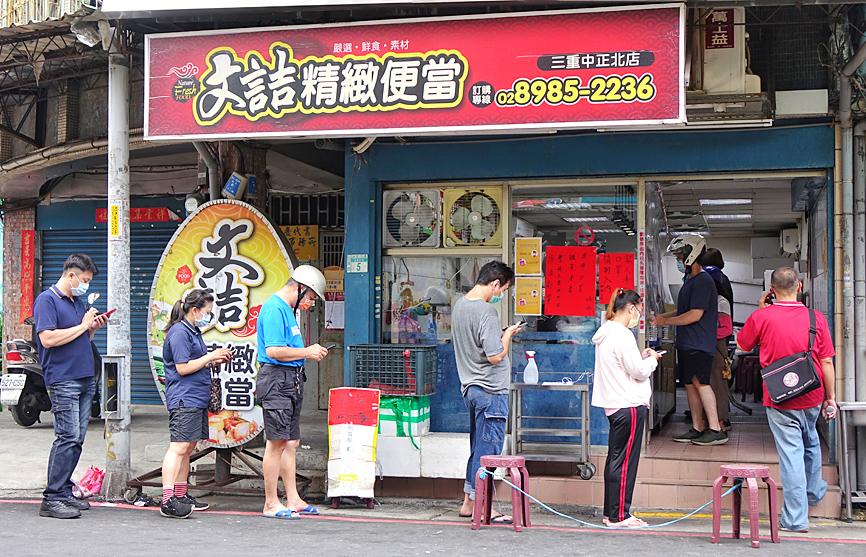Taiwan’s COVID-19 outbreak continued to batter domestic demand last month, especially in the food and beverage sector, the Ministry of Economic Affairs said yesterday.
Food and beverage sales were NT$42.6 billion (US$1.52 billion), up 11.1 percent month-on-month but down 38.8 percent year-on-year, as the nation was under a level 3 COVID-19 alert for most of the month and dine-in services only took off gradually afterward.
“In July last year, the food and beverage sector was starting a proper recovery from the initial shock of the COVID-19 pandemic,” Department of Statistics Deputy Director-General Huang Wei-jie (黃偉傑) said. “However, this July, it was still bearing the full brunt of a more serious outbreak.”

Photo: Lin Hsin-de, Taipei Times
Despite the COVID-19 alert being lowered to level 2 with the resumption of dine-in services in many cities, including Taipei and New Taipei City, Huang said that recovery of sales in the food and beverage sector would be sluggish.
“We might need to wait for the next round of stimulus vouchers before we see a more comprehensive recovery in the food and beverage sector,” Huang said.
The retail sector was also affected by COVID-19 restrictions, although to a lesser degree, the ministry said.
Retail sales totaled NT$301.5 billion, down 10.3 percent year-on-year but up 13.2 percent month-on-month, ministry data showed.
E-commerce platforms benefited from the pandemic-driven economy, with sales increasing 23.4 percent year-on-year to NT$23.5 billion, as did supermarkets, with sales rising 19.9 percent to NT$23 billion, and big-box stores, with sales rising 9.1 percent to NT$21.1 billion — each achieving a July record, the ministry said.
The nation’s wholesale sector bucked the trend by smashing a July record with sales of NT$1.063 trillion, up 11.1 percent year-on-year, which Huang attributed to continued high demand for 5G and artificial intelligence applications, and remote working devices, as well as the rising cost of raw materials.
“Most of the orders for wholesalers came from overseas amid a global economic recovery,” Huang said. “Wholesalers benefited more from overseas markets and were less affected by the local COVID-19 outbreak.”
In the first seven months of the year, food and beverage sales fell 7.4 percent year-on-year to NT$404.1 billion, while retail sales rose 3.3 percent to NT$2.22 trillion and wholesale trade increased 17.3 percent to NT$6.83 trillion, ministry data showed.

Nvidia Corp chief executive officer Jensen Huang (黃仁勳) on Monday introduced the company’s latest supercomputer platform, featuring six new chips made by Taiwan Semiconductor Manufacturing Co (TSMC, 台積電), saying that it is now “in full production.” “If Vera Rubin is going to be in time for this year, it must be in production by now, and so, today I can tell you that Vera Rubin is in full production,” Huang said during his keynote speech at CES in Las Vegas. The rollout of six concurrent chips for Vera Rubin — the company’s next-generation artificial intelligence (AI) computing platform — marks a strategic

Enhanced tax credits that have helped reduce the cost of health insurance for the vast majority of US Affordable Care Act enrollees expired on Jan.1, cementing higher health costs for millions of Americans at the start of the new year. Democrats forced a 43-day US government shutdown over the issue. Moderate Republicans called for a solution to save their political aspirations this year. US President Donald Trump floated a way out, only to back off after conservative backlash. In the end, no one’s efforts were enough to save the subsidies before their expiration date. A US House of Representatives vote

REVENUE PERFORMANCE: Cloud and network products, and electronic components saw strong increases, while smart consumer electronics and computing products fell Hon Hai Precision Industry Co (鴻海精密) yesterday posted 26.51 percent quarterly growth in revenue for last quarter to NT$2.6 trillion (US$82.44 billion), the strongest on record for the period and above expectations, but the company forecast a slight revenue dip this quarter due to seasonal factors. On an annual basis, revenue last quarter grew 22.07 percent, the company said. Analysts on average estimated about NT$2.4 trillion increase. Hon Hai, which assembles servers for Nvidia Corp and iPhones for Apple Inc, is expanding its capacity in the US, adding artificial intelligence (AI) server production in Wisconsin and Texas, where it operates established campuses. This

US President Donald Trump on Friday blocked US photonics firm HieFo Corp’s US$3 million acquisition of assets in New Jersey-based aerospace and defense specialist Emcore Corp, citing national security and China-related concerns. In an order released by the White House, Trump said HieFo was “controlled by a citizen of the People’s Republic of China” and that its 2024 acquisition of Emcore’s businesses led the US president to believe that it might “take action that threatens to impair the national security of the United States.” The order did not name the person or detail Trump’s concerns. “The Transaction is hereby prohibited,”